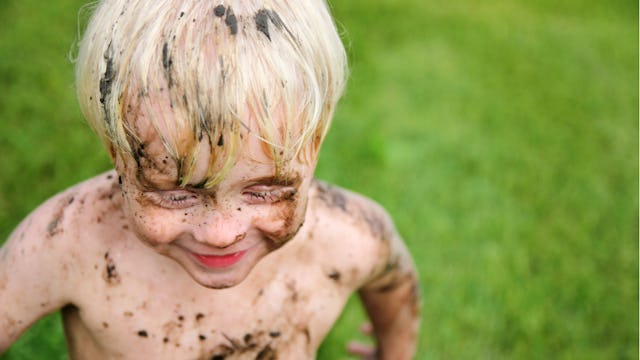An Easy Way To Help Your Kids Stay Healthy Through Adulthood? Let Them Get Dirty

By the time I had my fourth baby, I was very much over the whole “Don’t touch my baby because you have germs!” mentality. I’d had enough of antibacterial soaps, gels, and wipes, and honestly, so had the dried-out skin on my hands. What started out as seemingly the best way to keep my first baby from getting sick (wiping every single surface they came into contact with with sanitizing gels and sprays that killed 100% of everything) turned into something that was actually having the opposite effect on my children’s health.
Eventually, even science took note of the fact that having our children’s environments slathered in triclosan was not beneficial in any way, and actually had detrimental effects like the potential for these soaps to create antibiotic-resistant bacteria.
While marketers were having a field day convincing nervous mothers they needed an “antibacterial” component in everything from crib mattress pads to baby wipes, the FDA was issuing different warnings, and in 2016 released the following statement, “Companies will no longer be able to market antibacterial washes with these ingredients because manufacturers did not demonstrate that the ingredients are both safe for long-term daily use and more effective than plain soap and water in preventing illness and the spread of certain infections.”
Now back to my fourth child — whom I can confidently attest has not only been my dirtiest child, but also my healthiest. I never for a single second panicked about his older brothers walking in the door from school, going over to their little brother and picking him up and touching him with hands I can only imagine were covered with the germs of an entire school day. That baby was regularly left to crawl in the dirt in our yard, at the little league field, on high school gym floors, and anywhere and everywhere that held a complex variety of dangerous microbes.
But were they really dangerous? A new study says not in the least.
Northwestern University anthropologist Christopher Kuzawa has published the first-ever study showing that babies surrounded by germs grow up to have lower levels of inflammation in later life. This is not just about exposure to germs as babies helping them to be less sick as children. This is a long-term study that shows that same exposure leads to the development of an immune system whose healthy functionality goes well beyond childhood.
We know that inflammation in adulthood is a symptom of trouble at the cellular level and has been linked to a large variety of disease — from asthma to Alzheimer’s, diabetes, cancer, and even depression. If we can teach the body to better regulate its inflammatory response, we can reduce the chance it succumbs to these diseases.
And how is that done? Kuzawa contends that exposure to germs, especially in early life, educates our immune system and helps it regulate inflammation more effectively.
Unfortunately, in the U.S. (and other countries where germs are obsessively scrubbed away at every turn), we are seeing something called “diseases of affluence.” Thomas McDade, one of the researchers in the inflammation study, explains that poorly educated immune systems, and poor regulation of inflammation, partially explain the rising rates of celiac disease and allergies, as well as chronic diseases in places like the U.S., but they rarely appear in places like the Philippines, where babies are exposed to more dirt and bacteria from birth.
So where do we find these good bacterias? McDade states, “The microbial exposures that help our bodies learn to regulate inflammation are typically non-infectious — they’re in dirt, rotting vegetables and non-purified water systems. They have been a normal part of the human environment for millennia. These are not the microbes that cause measles or mumps or other infectious diseases.”
Parents, it’s time to put down the Purell, and let your little ones play in the dirt and immerse themselves in their surrounding environments — dirt, germs and all. You can give yourself a well-deserved break and give their immune systems the chance to develop as they explore their world. The benefits of both reduced sickness in the early years and less chronic disease and better health in the later years is worth a little mud, right?